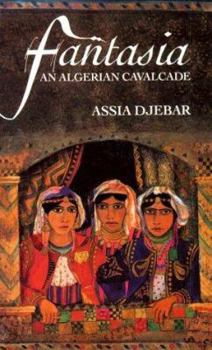Fantasia: An Algerian Cavalcade
Select Format
Select Condition 
Book Overview
In this stunning novel, Assia Djebar intertwines the history of her native Algeria with episodes from the life of a young girl in a story stretching from the French conquest in 1830 to the War of Liberation of the 1950s. The girl, growing up in the old Roman coastal town of Cherchel, sees her life in contrast to that of a neighboring French family, and yearns for more than law and tradition allow her to experience. Headstrong and passionate, she escapes from the cloistered life of her family to join her brother in the maquis' fight against French domination.
Djebar's exceptional descriptive powers bring to life the experiences of girls and women caught up in the dual struggle for independenceboth their own and Algeria's.
Format:Paperback
Language:English
ISBN:0435086219
ISBN13:9780435086213
Release Date:March 1993
Publisher:Heinemann Educational Books
Length:256 Pages
Weight:0.72 lbs.
Dimensions:0.6" x 5.3" x 8.5"
Grade Range:Postsecondary and higher
Customer Reviews
1 rating
A Classic of North African Literature
Published by Thriftbooks.com User , 19 years ago
A friend of mine once said that this was her all-time favorite book in French, and though that might seem a bit hyperbolic, I've come to consider it as one of my favorites as well (in fact, I ended up writing my Master's thesis on it, 100 pages, all in French, about this book alone!). The English translation does lack something, so if you can read French, by all means read the original, "L'amour, la fantasia". Djebar is a fascinating person- writer, scholar, and award-winning filmmaker- and this is arguably her best novel. Wrestling a voice for herself from the colonizer's language (French), she also struggles with the cultural implications of "unveiling" herself through that same language to a primarily foreign audience. Her innovative approach to this problematic is to structure her novel like a musical piece (a "fantasia") with various "movements" (chapters alternating between her own autobiography, the history of the fight for control of Algeria, and the "voices" of illiterate women whose stories she's translated and transcribed). The "fantasia" is also a traditional North African equestrian ceremony, in which men parade their horses before going off to battle, and in which women participate on the sidelines, as it were, cheering on the men by ululating. Without giving away the full implications of this double analogy (and hence some key elements of the story), the "fantasia" takes the form, generally, of both the means by which some Algerian woman are able to speak, as well as that of their traditional marginalization in the patriarchal society of Algeria. Musicality, orality, and the written word blend in this highly original work to portray the author's fragmented sense of self, and the final product is rendered in a beautiful prose. If you're interested in sampling some of the finest writing by any French-speaking author today, or are fascinated by these kinds of postcolonial aesthetic problematics, read this book! It's a classic!





